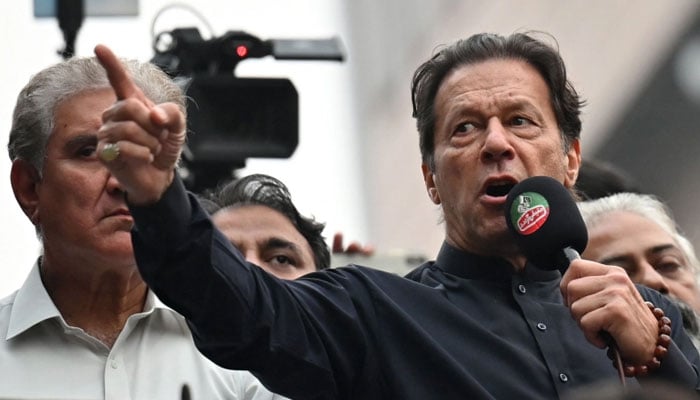ECP postpones hearing of cases against Imran Khan till December 20
Electoral body delists five cases against PTI Chairman Imran Khan, earlier scheduled for hearing on December 13, due to non-availability of bench
The Election Commission of Pakistan (ECP) on Monday delisted five cases against Pakistan Tehreek-e-Insaf (PTI) Chairman Imran Khan, scheduled for hearing on December 13.
The electoral body had initiated the process last week to remove Imran Khan as PTI chairman following his disqualification in the widely-discussed Toshakhana reference, serving the former premier a notice for the date of hearing.
However, it issued a new notification this morning, saying that the hearing of five cases against Khan have been rescheduled due to the absence of bench members. The hearing will now be held on December 20.
The delisted cases include the prohibited funding case, case for suspension of the notification of Khan's victory in a by-election, two cases over the removal of Khan from the PTI chairman's post and case related to submission of return of Khan's election campaign expenses.
ECP starts process to remove Imran Khan as PTI chair
On December 6, a notice was issued to Imran and the case was fixed for hearing on December 13, the day the electoral body was also to resume hearing on a show-cause notice to the PTI on the basis of the foreign funding case judgement.
Reacting to the notice, a senior PTI leader had questioned on what legal basis it was issued and said it had already been decided to write to Chief Election Commissioner Sikandar Sultan Raja for an explanation. He had insisted that there was no legal footing to remove a party leader and there was no bar on any convicted person from leading or becoming an office-bearer of a political party.
The Elections Act 2017 has not retained the provision, which was part of Section 5 (1) of the erstwhile Political Parties Order 2002, which read, “Every citizen, not being in the service of Pakistan, shall have the right to form or be a member of a political party or be otherwise associated with a political party or take part in political activities or be elected as an office-bearer of a political party: provided that a person shall not be appointed or serve as an office-bearer of a political party if he is not qualified to be, or is disqualified from being, elected or chosen as a member of the Majlis-e-Shoora under Article 63 of the Constitution of the Islamic Republic of Pakistan or under any other law for the time being in force….”
A three-member bench of the Supreme Court of Pakistan, headed by then chief justice Saqib Nisar in 2018 and consisting of Justice Umer Ata Bandial and Justice Ijazul Ahsan, had heard petitions challenging the Elections Act 2017. The three-member bench ruled in its judgement that former premier Nawaz Sharif did not qualify to serve as the PML-N president.
In October last, the commission had disqualified Imran in the Toshakhana reference under Article 63 (1) (p) for making "false statements and an incorrect declaration" and the written order read that the respondent had "intentionally and deliberately" violated the provisions contained [in] sections 137, 167 and 173 of the Elections Act 2017, as he "has made false statements and an incorrect declaration before the commission" in the statement of assets and liabilities filed by him for the year 2020-21.
The ECP had also said in its order: “Accordingly, he (Imran Khan) ceases to be a member of the National Assembly and legal proceedings will be initiated against him under Section 190 (2) of the Elections Act 2017.”
-
Security forces gun down 30 terrorists in multiple IBOs in KP: ISPR
-
MQM-P calls for new province in Sindh
-
US report validates Pakistan military edge over India: PM
-
Banned TTP poses serious threat to Pakistan security: UNSC panel
-
CM Afridi clarifies remarks on by-poll after ECP requests army deployment
-
Dubai sees 3.2m Pakistani passengers in 2025 as airport sets new milestone
-
Security forces kill 23 Indian proxy terrorists in KP's Kurram
-
Pakistan to construct island to boost oil exploration: report












